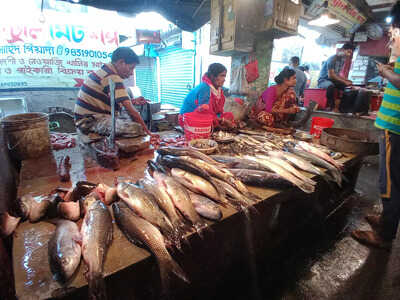Pandemic spikes business, price of fish in Bengal
Times of Bennett | Updated: Feb 01, 2022 17:37

By ARKA NASKAR
KOLKATA: Post pandemic, the world has changed for thefish -gorging Bengalis. Fish taste and price are no longer the same for most. That’s true for both fresh water and sea fish.
“The quality of the fish is no longer that good. I don’t know the exact reason for that. But the price keeps increasing everyday,” Sangeeta Naskar, a homemaker in Kolkata, complains.
Suvendu Banerjee , another regular backs Sangeeta. Naskar’s gripe? “The quality of sea fish is no longer that good. I have to be alert while buying my favorite fish,” he says, adding that he can’t pinpoint a reason for it.
One reason could be the over-harvesting of fish by people who lost their jobs due to the pandemic and returned to their native place to launch small fisheries units.
Others like Nimai Das, a regular at the localfish market , are however concerned about the price.
“The sudden increase in the price of fish is affecting lower middle class and the poor people. Fish, a staple for Bengalis, has become a luxury,” he added.
Not everyone, though, agrees with the consumers.
Sukumar Roy , owner of a local fishery unit and a wholesale supplier, has a different take on the subject. He says that oversupply of fish is a post-pandemic development that has led to the fish prices crashing in the retail market.
“Before the pandemic, the business was booming but post-pandemic, the market has entered into recession, due to COVID-19, many people lost their jobs. Most returned home to start small-scale fish farming which has led to over-supply and loss of quality control,” he explains.
Roy ’s income has crashed by around Rs 1.5 lakh a month. His pre-pandemic income was around Rs 6 to 6.5 lakh a month. Mithun Das, a local fish merchant who has been in this business for 45 years, blames the pandemic for the current scenario.
But he points out that “only prices of exclusive, high-end fish like Hilsa, shrimp have fallen. In the case of Hilsa, it is because of faulty fish farming practices like netting young fish or catching them during the spawning season, but overall, the demand for fish has not fallen,” he surmises.
West Bengal contributed 16.19 lakh tonne fish to the national food basket in 2019-20, local Fishery Extension Officer Mainak Sen said.
The State Government made Rs 243 billion in gross value from fish products in 2019. Sen denies there has been a crippling blow to fish availability or consumption on account of the pandemic, largely because of the backing of the local State Government.
“The fishery industry is growing. The Government is also training fish farmers through online sites and providing subsidies and fish feed,” he asserts.
KOLKATA: Post pandemic, the world has changed for the
“The quality of the fish is no longer that good. I don’t know the exact reason for that. But the price keeps increasing everyday,” Sangeeta Naskar, a homemaker in Kolkata, complains.
One reason could be the over-harvesting of fish by people who lost their jobs due to the pandemic and returned to their native place to launch small fisheries units.
Others like Nimai Das, a regular at the local
“The sudden increase in the price of fish is affecting lower middle class and the poor people. Fish, a staple for Bengalis, has become a luxury,” he added.
Not everyone, though, agrees with the consumers.
“Before the pandemic, the business was booming but post-pandemic, the market has entered into recession, due to COVID-19, many people lost their jobs. Most returned home to start small-scale fish farming which has led to over-supply and loss of quality control,” he explains.
But he points out that “only prices of exclusive, high-end fish like Hilsa, shrimp have fallen. In the case of Hilsa, it is because of faulty fish farming practices like netting young fish or catching them during the spawning season, but overall, the demand for fish has not fallen,” he surmises.
The State Government made Rs 243 billion in gross value from fish products in 2019. Sen denies there has been a crippling blow to fish availability or consumption on account of the pandemic, largely because of the backing of the local State Government.
“The fishery industry is growing. The Government is also training fish farmers through online sites and providing subsidies and fish feed,” he asserts.







